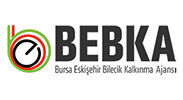INOVATION and EFFICIENCY
"Our agency aims to increase the competitiveness of the region by differentiating it from other regions in areas that will increase the added value of our regional economy, and by encouraging activities in which it is and can be superior and strong in competition. With the TR41 Region Innovation and Smart Specialisation Strategy prepared within this framework, we aim to increase the competitiveness level of the region by developing information and technology-oriented activities where entrepreneurial opportunities are prioritised with the implementation of effective macro and micro policies specific to the region.
On the other hand, we aim to contribute to the transition to sustainable production by reducing environmental impacts arising from production activities and increasing efficiency in resource and energy use. Thus, we offer a sustainable development approach that will not ignore the social and environmental components while supporting the increase in the international competitiveness of the region."
Our region, which consists of Bursa, Eskişehir and Bilecik provinces, is home to important sectors that determine the competitiveness of the national economy. In order to maintain the existing competitive advantages of our region, it is necessary to develop knowledge-oriented policies in the coming period. The TR41 Region Innovation and Smart Specialisation Strategy, which we have prepared as an agency, includes a strategic approach that will increase the added value of the regional economy and facilitate the focus on activities in which it is superior and strong in global competition and has the potential to be.
The fact that the sectoral structures of Bursa, Eskişehir and Bilecik provinces are different has led to the differentiation of the general economic development dynamics. In Bursa, there are many firms with R&D centres, export-oriented, medium and large-scale innovation-oriented activities. Eskişehir, on the other hand, is characterised by a productivity-oriented production economy. Bilecik is in the process of transition from a resource-based production structure to a productivity-based structure. In this direction, nanotechnology, advanced material technologies, mechatronics, automation and robotics technologies, precision manufacturing technologies and technical textile applications are the smart specialisation areas that stand out in our region.
TR41 Region, which hosts locomotive sectors such as automotive, textile, machinery-metal, furniture, aviation, rail systems, ceramics and marble, is one of the leading regions in the national economy in terms of employment, exports and added value.
In order to increase the share of medium-high and high-tech sectors in exports, there is a need to focus on more specialised areas and to encourage the transition to innovation and productivity-oriented, qualified, high value-added products and services that prioritise environmental sustainability.
According to TURKSTAT 2022 Foreign Trade results, TR41 Region ranks 4th among 26 regions in exports, and four of the top five countries in the target markets are members of the European Union. Within the scope of the preparation process against additional measures such as carbon regulation at the border within the scope of the European Green Deal, there is a need for capacity development in managing the carbon and water footprint of the exporting sectors in the region in terms of export sustainability.
Our Agency aims for a sustainable development target that does not ignore the social and environmental components while supporting the increase of the international competitiveness of the region. According to the World Business Council for Sustainable Development and Business (WBCSD), sustainable production and consumption is to contribute to environmental quality through the efficient production and use of natural resources, minimising waste and optimising products and services. Sustainable production approach is a production strategy that has economic returns as well as environmental benefits.
The dissemination of resource efficiency practices, which can also be described as a prerequisite for sustainable production, is extremely important and effective. However, when resource efficiency practices remain within the company boundaries, these practices can improve environmental performance to a certain level. For this reason, a holistic regional approach that can go beyond the boundaries of the company in order to achieve more gains and that will often provide inter-firm or even inter-sectoral co-operation increases the multiplier effect of resource efficiency practices.
The activities carried out by our Agency in this field started with raising awareness on the development of the concept of sustainable production in our region and continued with capacity building studies including exemplary practices in the production and service sectors.
When the distributions by number of firms and employment for all three provinces are analysed, it is seen that while some of the prominent sectors on a provincial basis are similar, there are also different sectors concentrated in different provinces. Therefore, resource efficiency potential differs for each province and sector. Our Agency plans its activities by focusing on sectors with high potential for expansion through feasibility and strategy determination studies.
This sectoral transformation approach, which is focused on innovation and efficiency, also directly overlaps with many policy areas in the Twelfth Development Plan. It is envisaged that the areas targeted for intervention will contribute to the policies and measures under the axes of Stable Growth - Strong Economy, Competitive Production with Green and Digital Transformation, Disaster Resilient Living Areas - Sustainable Environment.
We Support ‘New Generation’ Industrial Policies in Our Region
‘We believe that our agency should be an important coordinating organisation for our region. In this context, we aim to increase the effectiveness of our agency in the coming period in determining and guiding the needs of leading companies in our region. Thus, we plan for our Agency to undertake a new mission as a facilitator of ‘new generation’ industrial policies. We attach great importance to information and experience sharing on a national and international scale in order to develop smart specialisation areas by improving the innovation infrastructure and ecosystem in our region. In this context, we aim to realise cooperation with development agencies in our country and especially in European countries.’
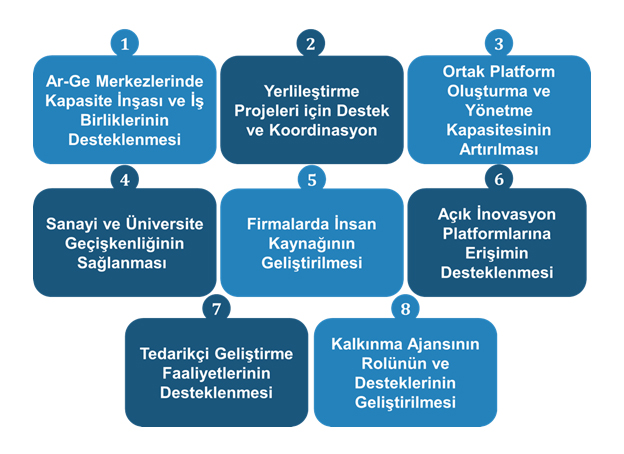
Programmes and activities proposed under the TR41 Region Innovation and Smart Specialisation Strategy:
Our activities completed so far in the field of Innovation and Smart Specialisation:
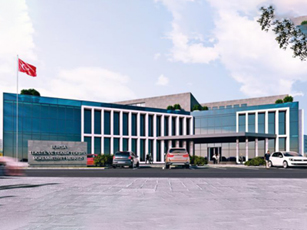
Textile and Technical Textiles Centre of Excellence
This centre, which was established with the support of a guided project by our Agency, provides R&D infrastructure for the textile and garment sectors in our country and was established as the first Textile and Technical Textile Centre of Excellence in Turkey. Within the centre, testing and inspection services are currently provided and vocational training activities are also carried out.
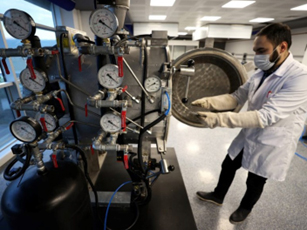
Advanced Composite Materials Research and Excellence Centre
Launched in Bursa Demirtaş Organized Industrial Zone in October 2020, the centre started to serve industrialists as both an R&D and test centre.
With the aim of making our region a technology base and accelerating the transition from labour-intensive products to knowledge-intensive and high value-added production, the centre provides services in a wide range of expertise from prototype production to testing and analysis activities.
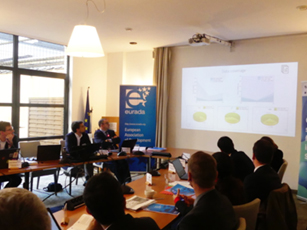
Oasis Project
It is a project that includes studies and analyses on the performance of innovation supports provided by Development Agencies on the growth and competitiveness of firms. Completed in October 2019.
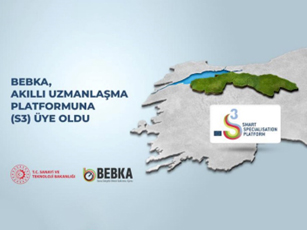
Membership to the European Commission Smart Specialisation (S3) Platform
Our Agency became a member of the European Commission Smart Specialisation (S3) Platform in 2020 in order to disseminate regional policies within the scope of smart growth, develop strategies and collaborations for this, provide guidance and good practice examples, and support regions in the fields of strategy and policy formulation.
As an agency, with the S3 membership, we plan to increase regional cooperation in the fields of smart specialisation, especially with European Union countries in the coming period. We aim to represent our region on international platforms and intensify promotion and investment activities. In this way, we aim to initiatives and joint work on maximising the use of European Union funds at the regional level.
Resource Efficiency in Our Region at a Glance
TR41 Region makes a significant contribution to the national economy with the foreign trade surplus it maintains as a result of its strong production structure in 28 Organised Industrial Zones, 2 special industrial zones and 1 free zone. There is a high potential for resource efficiency studies in the region due to the fact that the economic structure of the region is dominated by manufacturing industry. For example, the textile sector, which is one of the dominant sectors, has opportunities such as the use of groundwater and the treatment of wastewater. Measures to increase the water efficiency of the manufacturing industry are included both in our regional plans for three periods, 2010-2013, 2014-2023 and 2024-2028, and in the Action Plans and Basin Management Plans prepared by the Ministry of Agriculture and Forestry for the Susurluk and Marmara Basins.
Since its establishment, our Agency has organised many activities to increase resource efficiency in the region, and the projects implemented by the companies for the transition to environmentally friendly production and energy efficiency have been supported. With the programme, which was first opened under the title of sustainable industry, support was provided to the projects of the organised industrial zones in the region for improving the treatment facilities, increasing energy efficiency and using waste sludge as alternative fuel.
So far, 102.500.000 TL in 27 project support, 6 management consultancy and 1 feasibility support in the field of clean production; 35.177.000 TL in 19 project support, 1 management consultancy and 5 feasibility support in the field of waste recovery; 32.500.000 TL in 13 project support, 14 management consultancy and 1 feasibility support in the field of energy efficiency; 20.500.000 TL in 8 project support, 2 management consultancy and 5 feasibility support in the field of renewable energy. In these four areas, a total of 190.677.000 TL support has been provided so far. In addition, renewable energy and resource efficiency seminars were organised separately for local governments and the private sector.
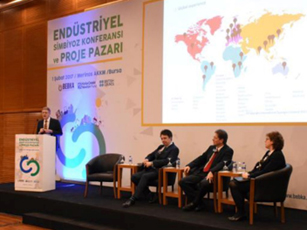
Newton-Katip Çelebi Fund
We believe that industrial symbiosis is an important tool for transition to low carbon economy and resource efficiency in our region. For this purpose, with the support of the Newton-Kâtip Çelebi Fund for the development of a regional industrial symbiosis network and management model, we have increased awareness and improved institutional capacity in the region.
We had the opportunity to share experiences with the executives of the UK National Symbiosis Network, which is one of the most well-known examples implemented on a national scale in the world.

Industrial Symbiosis Programme
With the support we provided for Industrial Symbiosis, 3 thousand tonnes of waste was transformed into a product or raw material instead of being disposed of, and 23 people were employed. Plywood (plywood) was produced from PVC and wood waste, wall cladding and natural stone carpets were produced from mining waste. There were companies that applied for a trademark with their new products and increased their exports.
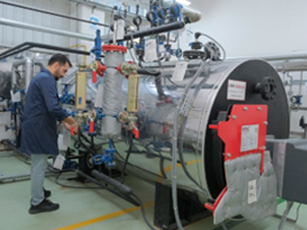
Energy Efficiency Centre
The Energy Efficiency Centre (EEC), established with the support of our Agency, raises awareness on energy efficiency in the business world with survey, training, measurement, consultancy and energy management system services.
Within the scope of the Innovation
Within the scope of the Innovation and Productivity Result-Oriented Programme, with the slogan ‘do more work using less resources’ to achieve the goal of sustainable production in our region;
- To raise awareness of the environmental benefits that resource efficiency practices will provide to organisations and companies as well as potential economic gains,
- To encourage industrial enterprises in the region to use resources efficiently by creating good practice examples,
- Expansion of industrial symbiosis practices in the OIZs in the region and implementation of Green OIZ practices,
- We aim to increase the rate of utilisation of international funds for resource efficiency by institutions and companies in the region.
In this direction, in the fields of green efficiency, industrial symbiosis, energy efficiency and clean production in our region;
- Analysis and strategy development,
- Financial support programmes and feasibility studies,
- Joint projects with international organisations,





